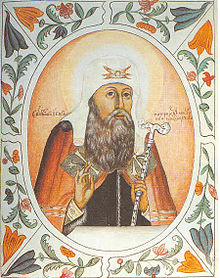Patriarch Job of Moscow
Job | |
|---|---|
Patriarch of Moscow and all the Rus' | |
 | |
| Church | Russian Orthodox Church |
| See | Moscow |
| Installed | 26 January 1589 |
| Term ended | June 1605 |
| Successor | Ignatius |
| Personal details | |
| Born | Ioann (Russian: Иоанн) unknown |
| Died | 19 June 1607 Staritsa |
| Buried | Dormition Cathedral, Moscow |
Job (
Early life
His birth name was Ioann (
Career
Job spent fifteen years in the cloister and finally became its abbot in 1566 with the help of Ivan the Terrible, who had made Staritsa his residence during the time of the Oprichnina. According to Debra A. Coulter, "Job was known as a humble man of impeccable morals, learned for his times, who worked for the good of the church and the promotion of Orthodox Christianity."[2]
In 1571, Job was transferred to
.
Though a person of mediocre mental abilities, he nevertheless managed to draw the attention of
Patriarchate
Realizing the necessity of strengthening the
Job did not approve, however, of Godunov's proposal to open a
He assisted in the
In 1591, he headed the official enquiry into the death of Tsarevich Dmitry in Uglich. After consulting with the church council and the duma of boyars, the patriarch announced his verdict – the tsarevich had accidentally stabbed himself and not been murdered. In that year he also founded the Donskoy Monastery in Moscow.
Civil career
After the death of
Job was known as a harsh critic of
Death
He died a very sick man in 1607. In 1652, Job's
References
- ^ "Repose of St Job the Patriarch of Moscow, and All Russia", Orthodox Church in America
- ^ James R. Millar, ed. Encyclopedia of Russian History (2003) 2:706–707.
